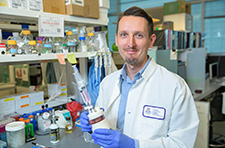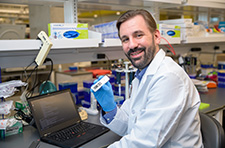
ABRC Awards Prestigious Grants to Eight Researchers at the College

The Arizona Department of Health Services, Arizona Biomedical Research Commission (ABRC) has recognized the research efforts of eight investigators at the University of Arizona College of Medicine – Phoenix with grants totaling more than $2.8 million over three years.
Achieving distinction in translational research has been part of the University of Arizona College of Medicine – Phoenix’s mission since its inception. These awards are reflective of that vision. They are also indicative the scope and diverse array of research discoveries being made in labs across the college’s campus.
“We are especially appreciative and excited about the College of Medicine – Phoenix faculty who have received research funding from the ABRC this year,” said Chris Glembotski, PhD, associate dean of Research and director of the Translational Cardiovascular Research Center. “This funding is critical, since it fuels the development of new research project ideas into proposals for future funding from nationwide research funding organizations — such as the National Institutes of Health.”
Learn About Their Exceptional Research
*Arizona New Investigator Award Recipients
- Paweł Łaniewski, PhD, Assistant Research Scientist in the Department of Basic Medical Sciences – His research studies on Sneathia genus (S. amnii/vaginalis and S. sanguinegens) hope to produce key insights into the function and impact of these bacteria on host defense, physiology and metabolism, revealing further research avenues and potential prophylactic and/or therapeutic strategies that may enhance women’s health outcomes in Arizona.
- Zhiyu Dai, PhD, Assistant Professor of Internal Medicine and Clinical Translational Sciences – His proposed studies Chronic Obstructive Lung Disease (COPD) will investigate the pathogenesis of cigarette smoke-induced PH and hope to discover novel therapeutic targets to treat patients with PH-COPD.
- Eric Blackwood, PhD, Research Scientist in the Translational Cardiovascular Research Center – His study focuses on ATF6 in HFpEF, with the hypothesis that the accumulation of cytotoxic misfolded proteins in HFpEF triggers activation of ATF6. This is required for mitigating proteotoxicity in atrial and ventricular cardiomyocytes.
- Tobias Jakobi, PhD, Assistant Professor of Internal Medicine – His proposal aims to decipher a critical cell-cell communication component contributing to pathological cardiac hypertrophy. The knowledge obtained in this study will lead to the development of new ways to diagnose and treat CVD earlier, which will have a positive impact on the health of Arizonans.
- Won Hee Lee, PhD, Assistant Professor of Basic Medical Sciences and Clinical Translational Sciences – Her research uses a combination of human iPSC-ECs derived from healthy and T2D patients, as well as other models to delineate novel molecular mechanisms responsible for health risks posed by e-cigs in terms of accelerating the onset and severity of obesity/diabetes.
- Shalini Sharma, PhD, Associate Professor of Basic Medical Sciences and Clinical Translational Sciences – An estimated 30,638 Arizonans are diagnosed with invasive cancer yearly, and an average of 11,336 die from cancer each year. The proposed research aims to address the critical need for the identification of new targets and the development of personalized therapeutic options for cancers associated with splicing factor mutations.
*Arizona Investigator Grant Recipients
- Melissa Herbst-Kralovetz, PhD, Associate Professor of Basic Medical Sciences, Obstetrics and Gynecology, and Clinical Translational Sciences – Her proposed study will contribute to the development of non-invasive diagnostics, enabling early detection of endometrial cancer (EMC) and, consequently, reducing the morbidity and mortality associated with this common cancer in Arizonan women.
- Deveroux Ferguson, PhD, Associate Professor of Basic Medical Sciences, Psychiatry and Clinical Translational Sciences – The object of Dr. Ferguson’s project is to use models to investigate molecular and circuit mechanisms underlying cocaine addiction, including cell-type specific roles of corticolimbic circuits and their mal-adaptations during cocaine addiction.
*The Arizona New Investigator Award is for $225,000 over three years. And the Arizona Investigator Grant is for $750,000 over three years.
About the College
Founded in 2007, the University of Arizona College of Medicine – Phoenix inspires and trains exemplary physicians, scientists and leaders to advance its core missions in education, research, clinical care and service to communities across Arizona. The college’s strength lies in our collaborations and partnerships with clinical affiliates, community organizations and industry sponsors. With our primary affiliate, Banner Health, we are recognized as the premier academic medical center in Phoenix. As an anchor institution of the Phoenix Bioscience Core, the college is home to signature research programs in neurosciences, cardiopulmonary diseases, immunology, informatics and metabolism. These focus areas uniquely position us to drive biomedical research and bolster economic development in the region.
As an urban institution with strong roots in rural and tribal health, the college has graduated more than 1,000 physicians and matriculates 130 students each year. Greater than 60% of matriculating students are from Arizona and many continue training at our GME sponsored residency programs, ultimately pursuing local academic and community-based opportunities. While our traditional four-year program continues to thrive, we will launch our recently approved accelerated three-year medical student curriculum with exclusive focus on primary care. This program is designed to further enhance workforce retention needs across Arizona.
The college has embarked on our strategic plan for 2025 to 2030. Learn more.


